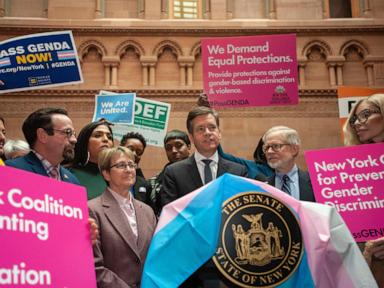Personal care product use during pregnancy, lactation may increase exposure to ‘forever chemicals’: Study

The use of certain personal care products during pregnancy or lactation may be linked to increased levels of "forever chemicals" in both blood plasma and breast milk, a new study has found.
While past research has confirmed the presence of these toxic compounds in such items, the study authors sought to determine whether the use of nail polish, makeup and hair dyes alters the concentrations of the compounds in the body during and after pregnancy.
Exploring this question in the maternal context was important because prenatal exposure to the chemicals — per- and polyfluoroalkyl substances (PFAS) — has been connected to adverse birth outcomes, according to the researchers, who published their findings in Environment International.
Some such effects include reduced birth weight, preterm birth, certain neurodevelopmental disorders and diminished vaccine uptake in children, according to the multi-national research team.
Known for their ability to persist in the body and the environment, PFAS are already linked to a variety of serious health conditions, including thyroid disease, kidney cancer and testicular cancer.
There are thousands of types of PFAS, many of which are known for their nonstick and water-resistant properties — making them frequent ingredients in cosmetics and numerous household products.
To evaluate the personal care product and pregnancy question, the researchers analyzed data from the Maternal-Infant Research on Environmental Chemicals Study, which included 2,001 pregnant people from 10 Canadian cities, between 2008 and 2011.
The scientists considered the contributions of personal care products to PFAS concentrations in both prenatal blood plasma, from six to 13 gestational weeks, and human milk, from two to 10 weeks postpartum.
They also received reports from participants about the frequency of product use across eight categories during the first and third trimesters, one to two days postpartum and two to 10 weeks postpartum.
Participants who wore makeup daily in the first and third trimesters had 14 percent and 17 percent higher PFAS concentrations in their blood and breast milk, respectively, compared to those who did not, according to the study.
People who used colored-permanent dye one to two days postpartum had 16 to 18 percent higher levels of PFAS in their milk than those who did not use dyes, the researchers found.
Because the study only evaluated four types of PFAS commonly used in industry and commerce, the authors stressed their belief that their results were an underestimation of exposure levels.
Despite the alarming nature of their results, the scientists stressed that on the plus side, such scientific evidence can help inform future regulation and guide individual choices.
“While PFAS are ubiquitous in the environment, our study indicates that personal care products are a modifiable source of PFAS,” lead author Amber Hall, a postdoctoral research associate in epidemiology at the Brown University School of Public Health, said in a statement.
“People who are concerned about their level of exposure to these chemicals during pregnancy or while breastfeeding may benefit from cutting back on personal care products during those times,” Hall added.
-

Decontamination of landfill waste leads to increase in toxic chemicals, says study
World - The Guardian - November 4 -

FDA investigating 'forever chemicals' in seafood
Politics - The Hill - Yesterday -

Buccaneers' Baker Mayfield will not be disciplined for using nicotine product during game, per report
Sports - CBS Sports - October 25 -
Pandemic-era drinking increases persist, study shows
Top stories - CBS News - November 11 -
New study shows an increase in heavy drinkers
Top stories - CBS News - November 12 -

New Yorkers may change their constitution to ban discrimination over ‘pregnancy outcomes’
Health - ABC News - November 5 -

A Review of 7,000 Studies Says You Should Be Worried About Microplastics. Here Are 5 Simple Ways to Limit Your Exposure
Business - Inc. - October 24 -
How to increase or cut your exposure to Nvidia and other hot Big Tech stocks
Business - MarketWatch - October 26 -

Global plastic production must be cut to curb pollution, study says
World - The Guardian - 6 days ago
More from The Hill
-

12:30 Report — Trump's embattled nominees
Politics - The Hill - 24 minutes ago -

Gaetz withdraws from attorney general consideration
Politics - The Hill - 28 minutes ago -

For Iran, disinformation comes just behind assassination
Politics - The Hill - 29 minutes ago -

Jussie Smollett conviction overturned by Illinois Supreme Court
Politics - The Hill - 39 minutes ago -

Trump Cabinet picks: Here’s who’s on the list to carry out his agenda
Politics - The Hill - 59 minutes ago